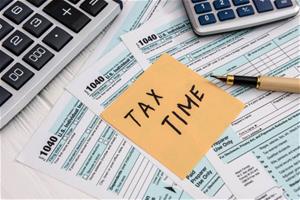NOTE: This post includes general tax tips, but tax laws are complicated, and not every tip makes sense for everyone. When making tax-related decisions, please contact the IRS or consult with a professional tax advisor.

Hardly anyone enjoys thinking about taxes, but by learning the ins and outs of tax management, you can reduce your stress and save money. So let’s dig in. First, the good news: Taxes are used to pay for all the services we enjoy, like paved roads and sidewalks, benefits, government offices, libraries, defense and environmental protection, and much more. The bad news: Taxes erode wealth.
Someone once told me they would love to be able to pay $100,000 in taxes each year. I didn’t understand. He followed the statement with, “Do you know how much you have to make to pay a $100,000 in taxes each year?” Okay, I get it, but very few of us make the income it would take to owe $100,000 in taxes.
Here are a couple of tips for managing taxes and possibly reducing the amount of income taxes owed to help preserve more wealth for the Future YOU!
Be prepared by keeping all your documents in one place. Certain expenses MIGHT be tax deductible (this depends on your situation; a tax professional can guide you). To be safe, keep your receipts for expenses such as childcare, tuition, unemployment benefits statements, mileage and other allowed expenses. By the end of January, you receive your W2 and 1099 from jobs you worked and interest earned on money being saved. These are important documents. Keep everything in a folder or envelope.
If eligible, get free tax assistance. If income eligible, use free tax preparing sites like VITA – Volunteer Income Tax Assistance or services offered by AARP. VITA sites are located all over the county, staffed by volunteers who are trained by IRS staff. This year most of their sites will be virtual. Make sure you have access to a secure computer to scan and email or fax the needed documentation.
Keep in mind that most commercial tax preparers charge no less than $200. If you qualify for free services, here’s an idea: Take the $200 you would have paid to have your taxes prepared and open an emergency savings account.
Common Ways to Optimize Your Tax Payments
Taxes can’t be avoided, but there are ways to help reduce how much you pay overall or to defer taxes (that is, pay later) to when your income may be lower.
Manage your deductions. When you start a new job, you get a W4 form to state how many deductions you are claiming—how much in taxes to take out of your paycheck. A higher deduction means more money in your take-home pay, but too many deductions may leave you owing money at tax time. For many people, it means deciding how much money you receive each pay period versus getting a large refund once a year. Be sure to claim the right number of deductions for your personal situation. If you are unsure, ask your employer’s HR representative or consult with a tax advisor. Your W4 can be changed at any time throughout the year.
Consider saving more from your paycheck. Many people like to get a big income tax return, but remember, the government is holding your money all year without paying you interest. Consider bringing more of your money home each pay period and placing it in an interest-bearing account. You will get it in smaller amounts, but the value grows as it earns interest through the year. Money in your hand today is worth more than money you receive later. That’s a double win!

Make the most of your tax refund. If you’re one who wants to get the big tax return at the beginning of the year, use the 1/3 RULE for how you allocate it:
$$$ 1/3 on that vacation or thing you’ve been waiting to buy
$$$ 1/3 to catch up on payments that are behind or pay ahead so you’re not paying “just in time” or late fees
$$$ 1/3 split between your emergency savings and retirement savings like a Roth IRA. If you don’t have emergency savings, use the entire 1/3 to get it started.
Take advantage of pre-taxed savings. Families and individuals who end up paying taxes after filing should look at decreasing the number of deductions on their W4 and/or increasing their contributions to a pre-tax savings account. Pre-tax savings accounts can include things like employer retirement plans, a dependent care account, pre-taxed qualified parking, or a health savings account. In many cases, these kinds of accounts can help reduce the taxes you owe.
Think about pre-taxed accounts this way: they often involve services, like health care, that you will pay for no matter what. When you use a pre-tax plan, money for these services is taken out of your check and placed in a separate account before taxes. For example, if you are in a 25% tax bracket, you will typically pay $25 for every $100 you earn. But if you have $25 go into a pre-taxed account, you will pay taxes on $75, not $100. The $25 dollars going into a pre-taxed account is not taxed.
These accounts have maximum contribution amounts based on household size. Find out more from your employer or tax professional.
Consider increasing savings and paying taxes later. Some people reduce their tax bill by starting a tax-advantaged retirement savings account. Different kinds of retirement accounts are taxed in different ways and have different advantages for your planning purposes. In some cases, you will not have to pay taxes on this money until you withdraw it, normally at retirement age. Consult with your tax professional or contact us at Self-Help to find out more about the accounts we offer that can help you save for the future.
***
These are just a few general ideas on tax management, but I hope this will help you think about ways you can build more wealth by lowering your tax bill and increasing your savings. As you prepare your taxes this year, be sure to get the help you need from nonprofits or the IRS.